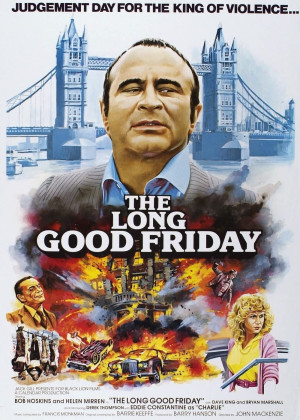One bloody Friday
Written on 28 Mar, 2021
For a long time The Long Good Friday was on my to-watch list, without ever making it onto my watched list. I was far too young to watch it in 1980 and it only found its way onto TV occasionally, and never when I was in the mood. But now, I’ve finally made time for this slice of London Gangster drama.
John MacKenzie’s film predicts the changing face of London as the Thatcherite 80s began. Harold (Bob Hoskins) is the top dog in the world of hard London gangsters; with a plan to move on from thuggery. At the beginning of the movie he is back in London preparing to convince American business associates the London Docklands are the place to invest, and he’s the man to handle the investment.
Harold outlines his vision whilst cruising up the Thames past the derilict Docklands he sees ripe for change. With 40 years hindsight it’s surprising to see how much The Long Good Friday got right about London’s regeneration, and tragic to see how the idea of London as the European capital has disappeared post-Brexit.
"Our country's not an island any more. This is the decade in which London will become Europe's capital, having cleared away the out-dated. We've got mile after mile or acre after acre of land for our future prosperity. No other city in the world has got, right at its centre, such an opportunity for profitable progress."
That’s The Long Good Friday looking to the future. In 1980, London, as viewed from a Northern town, was a grimy, polluted, unwelcoming place and it’s this city the film puts on view. Watching it I could smell the dirt and easily imagine a city swarming with villains.
An assumed turf war between villains powers the plot. Those closest to Harold are being killed, his empire is being bombed, and nobody is owning up to it. The tension is maintained right though the 1 hour 54 minute running time, helped by fantastic acting from the entire cast and tight direction.
Structuring a gangster film as a ‘whodunnit’ is a clever move. There’s no glorifying of the violence and Harold is certainly no anti-hero. The question of who is behind the attacks keeps the audience engaged when there isn’t a central character to root for. The revelation of why the attacks are happening is a perfect early-80s moment, delivering a culprit anyone who knows that fractuous period of UK history will understand.
